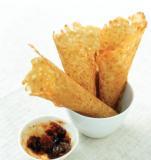Health Topics
-
Healthy Living
-
|
| |
| Encouraging Traditional Food for Children |
|
Anju Poddar
|
|
|
 |
Growing up children require a wholesome, well balanced diet. Proteins, carbohydrates, minerals, fats, vitamins and all essential nutrients are required in correct proportions for well rounded growth. |
|
In our fast paced age, a lot of short cuts have come up in all walks of life. Easy-to-serve less time consuming fast food with lots of preservatives has become an easy way out for working mothers. Just to mention some inherent benefits of traditional food for growing children: |
| |
- It is healthy
- Homemade food is made with love
- Is fresher than off-the-shelf products
- Has no preservatives
- Inculcates right habits
|
 |
|
| |
Traditional Snacks
- Rolls, samosa, cutlet.
- Little idlis, dhokla, khandavi.
- Sprouts’ salad made like chaat.
- Roti rolls variation – keep the child guessing what is in the tiffin, a surprise everyday!
- Quick traditional bites without preservative – khakra (Gujarati).
- Sweet besan laddoos with dry fruits.
|
|
| |
|
All food items made from refined products like maida, sugar etc come under the non-healthy category. These have to be replaced by healthier options like multigrain flour and jaggery for example. As against a burger with maida and deep-fried cutlet, you can have multigrain chapati with a filling of paneer, greens, etc, and peanut chikki made of jaggery for in-between meals.
|
| |
Try these homemade snacks:
- Kids love food with cheese fillings – make cheese parantha, cheese dosa.
- Sweets – traditional favourites like laddoo, kheer, halwa, home made fruit ice cream.
- Healthy paapdi chaat with sprouts.
- Choco cereals can be made into a mix and match savoury, by converting into chidwa.
- Keep plenty of fresh fruits in the house instead of fried or sweet snacks. Make fruits a part of every meal. Fruits can be presented to god as prasadam and then given to the children and family members.
- Milk is most important. You can present milk in a variety of ways. Add fruits to make banana milk shake, or chocolate, strawberry syrup for other shakes. Adding a spot of coffee or tea for flavouring gives children the feeling of imitating adults.
- You can also give them flavoured yogurt or yogurt with fruits.
|
|
|
|
| |
|
What parents eat, children will also eat
Nowadays, young conscious mothers are breast-feeding their babies realising the nutrient values and several other advantages. My young daughter replaced Cerelac and processed fruits with rice and dal khichdi, pongal and freshly stewed apples. Mothers are happy and satisfied that nutrition is being taken care of while the children’s tastebuds are tickling. Lifelong food habits are formed by what is served to them at home.
Here are a few things to remember:
- Foreign processed and canned foods – due to additives of colour etc are unhealthy in the long run.
- Too much of refined flour – due to lack of roughage – make the child prone to constipation.
- Avoid sugar and give them only a very little quantity of tea or coffee. Habits are formed from childhood, when we are serving these foods to our children.
- The food presented to the child needs to be served with a great variety of interest – fancy napkin holder and the like.
- Placemats with alphabets and numbers.
- Eat at a stipulated place – not all over the house.
- Finish over a period – not prolonged for hours.
- Using the finger-bowl as a daily routine is inadequate – the traditional mouth rinsing is hygienic and helps avoid multiple cavities.
- Be a good example – advice is good, but example is best. So parents, be a good example.
|
For quick shots of energy
- Paneer tikkas are a hot favourite.
- You can replicate pizzas, burgers with chapati rolls.
- Stuffed rotis made with different fillings.
- Pav bhaji is a good substitute for burgers. They are full of veggies, and thus are a healthier option.
- North Indians could try some lemon rice from the South or poha from Gujarat and Maharashtra. South Indians could try daal ki roti of Rajasthan, poha from Maharashtra, tikki from North India.
|
|
| |
 |
Anju Poddar is a successful homemaker fascinated by Hindu traditions and festivals. She has authored four well received books. |
|
| |
|